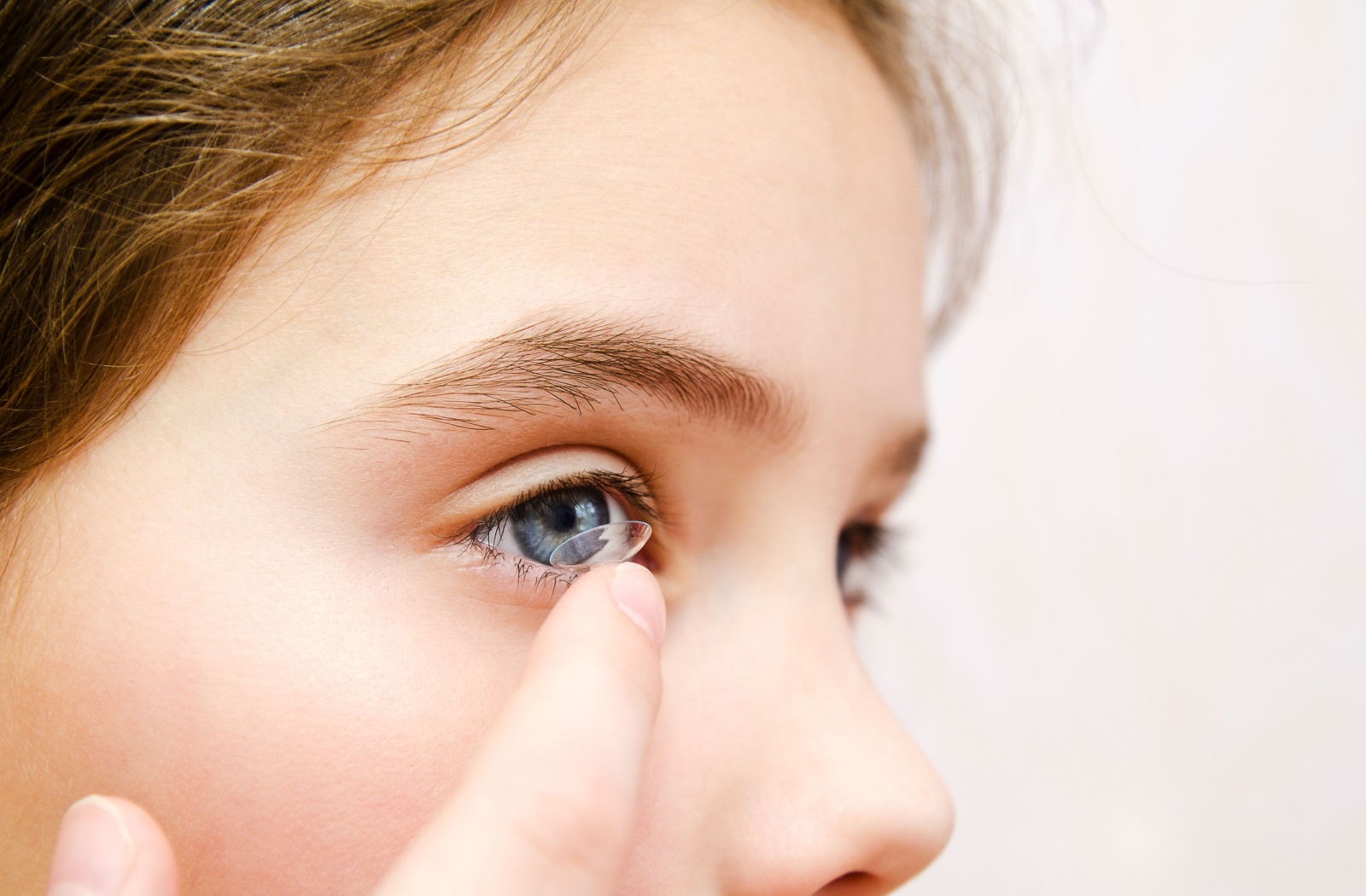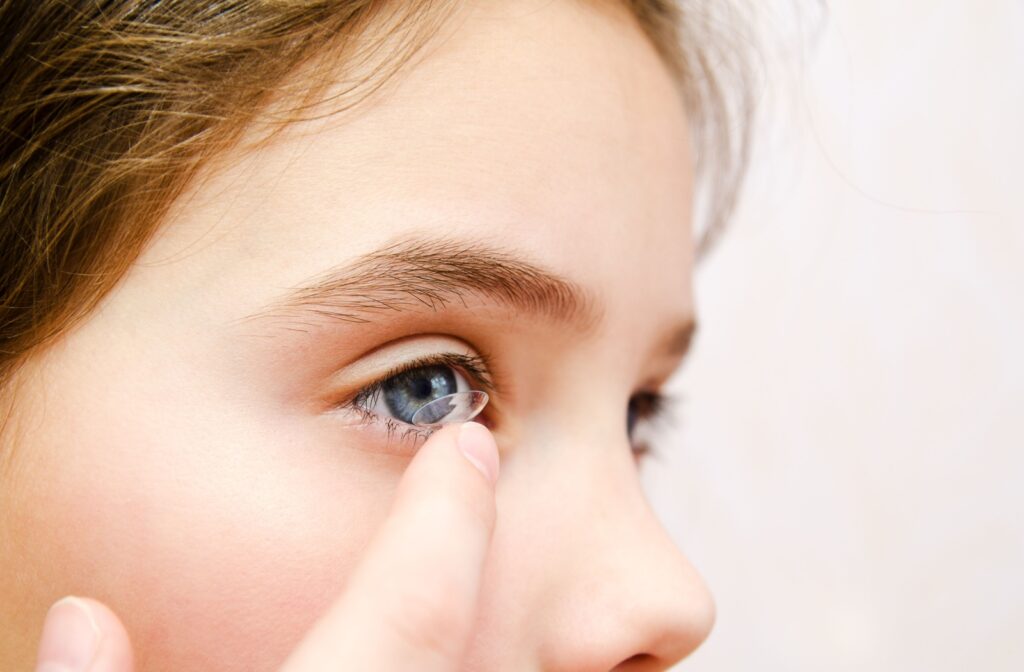When children begin to show signs of vision problems, glasses aren’t the only option. For many kids, contact lenses can bring freedom, comfort, and practicality. While the idea of your child wearing contacts might seem daunting, it doesn’t have to be. With your help and guidance, your child can learn to safely use their contacts and enjoy all the benefits these lenses offer!
The best contact lenses for kids depend on their unique preferences and circumstances. There are several types of lenses, each with a different goal. Before making a decision, you’ll need to book a contact lens fitting and exam with your optometrist.
Can Kids Wear Contact Lenses?
Age isn’t the only factor when thinking about contact lenses. Your child’s maturity matters as well. Contact lenses require consistent cleaning and care—without this, there’s a higher risk of irritation and even infection.
If you think your child is ready for contact lenses, your first step is to visit your optometrist. Eyeglasses and contact prescriptions aren’t the same, so you can’t convert one to the other. You’ll need the specific measurements from a contact lens fitting. Your optometrist will examine your child’s eyes to determine if contact lenses are a safe choice for them.
Contacts for Clear Vision
If your optometrist thinks contacts are a good choice, they’ll walk you through your options. There isn’t a universal type of lens—instead, there are several, depending on your situation.
Standard contact lenses correct vision issues like nearsightedness or farsightedness. These come in all kinds of materials and are a reliable alternative to glasses. For standard lenses, your options include:
- Daily disposable lenses, which are for one-time use only. These are convenient, as they don’t require regular cleaning.
- Rigid gas-permeable lenses, which are harder and more durable. These take some time to adjust to and require regular cleaning and maintenance.
- Hybrid lenses, which blend these options. These don’t tend to last as long as rigid lenses but are more comfortable. They also require regular maintenance.
Your optometrist will work with your child to find a lens that’s comfortable while still meeting their needs.
Myopia Control Contacts
Myopia, or nearsightedness, is an extremely common problem. Fortunately, there’s a treatment option called “myopia control” designed to slow this condition. Myopia control aims to preserve more of your child’s future vision and slow the eye’s growth.
To do so, myopia control uses special contact lenses with several prescriptions built into a single lens. One prescription corrects their vision while the other alters light as it enters the eye. These lenses are extremely beneficial and come in all kinds of options. They’re an excellent choice if you’re looking to invest in your child’s future eye health.
Orthokeratology Contact Lenses
Orthokeratology, or ortho-k, takes a unique approach to clear vision. Rather than wearing these lenses during the day, your child wears them overnight.
While your child sleeps, these lenses gently reshape the cornea overnight. Then, once the ortho-k lenses are removed, your child will have clear vision throughout the day! Their cornea will slowly revert to its usual shape, and the lenses are re-inserted that night.
This option is useful for kids who want freedom from wearing correction during the day. It even helps reduce how far myopia progresses, making it a popular choice for parents and children.
Specialty Contacts
Sometimes, unique conditions develop in a child’s eyes. Conditions like astigmatism, dry eyes, or corneal defects can alter how comfortable contact lenses are.
If this is the case, your child may be able to use specialty contact lenses. There are several options:
- Scleral lenses, which are larger than normal lenses. They rest on the whites of the eyes and arch over the cornea, leaving a small gap underneath. These are ideal for astigmatism and dry eyes.
- Toric lenses, which include different focusing powers at different angles to correct corneal problems. These align with unusually shaped corneas to provide clear vision.
Your optometrist may recommend one option over the other depending on your child’s specific eyes.
The Pros & Cons of Contacts for Children
Contact lenses can be an excellent decision for a child. However, they do have their own pros and cons.
The pros of contacts for children include:
- Your child gains a larger field of view
- You don’t need to worry about broken and damaged frames
- The lenses are more suitable for an active lifestyle
The cons of contacts for children include:
- Maintaining proper hygiene requires an ongoing commitment
- They often have a higher cost compared to glasses
- There is a learning curve for insertion, removal, and maintenance
You’ll need to consider whether or not your child will practice proper contact lens hygiene. Otherwise, there’s a higher risk of irritation and infection.
Tips For Helping a Child Take Care of Their Contacts
Teaching your child to care for their contacts is an important step. Try to create a simple routine, and make sure to monitor them at first. Contact lenses require daily care tasks, including:
- Washing hands thoroughly with soap and water before handling their contact lenses.
- Rinsing the contact lenses with the solution provided, as instructed by the optometrist.
- Gently rubbing the lenses with the solution to remove buildup or debris.
- Storing the lenses in a clean, fresh contact lens solution every night.
- Cleaning the case with solution and letting it air dry daily to prevent contamination.
- Constantly checking the expiration date to make sure the case, lenses, and solution are safe.
With consistency, your child can develop proper contact lens hygiene. This is the key to clear vision and safe eyes.
Considering Contacts For Your Child?
At The Eye Avenue, we see kids ages 5 and up. If your child is dealing with poor vision, contact lenses may be able to help. So come visit our team at The Eye Avenue! Our team can work with your family to find out if contact lenses are a safe and effective choice for your child. We’re here to help, so book an appointment with us today!




